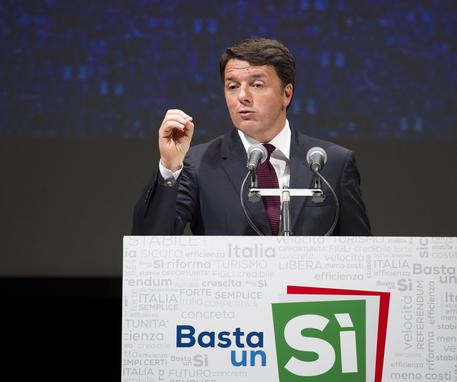The reforms, which were initially proposed back in 2014, were approved by an absolute majority in both the Senate and the Chamber of Representatives, however, they failed to meet the qualified majority of two-thirds required to be immediately enacted.
Under Act 138 of the Constitution, they must now face a referendum.
Primarily, Renzi has advocated for an overhaul of Italy’s political machinery to reduce corruption and political instability, tighten fiscal spending and improve the sluggish nature of legislative processes.
Should Renzi win the referendum, this would be the most far-reaching reform of the Italian Constitution since the abolition of the monarchy and the 1946 birth of the Italian Republic.
The package of reforms proposed by Renzi would put an end to Italy’s unusual “perfect” bicameralism, in which the Senate and the Chamber of Representatives share equal status and responsibilities.
The reform also outlines that the current Senate of the Republic would evolve into a Senate of Regions - a less powerful body representing only regional and local institutions - while the Chamber of Representatives would possess the majority of power.
The Senate of Regions would be reduced from 315 seats to 100, divided proportionally based on each region’s demographic weight, and predominantly made up of local councillors or mayors.
Furthermore, the members of the Senate would be nominated by representatives of the regional councils, as opposed to being elected by the public.
It has not been confirmed just how the regional councils will elect Senate members, and this would only be decided upon the approval of the reforms.
These changes to the Senate could potentially simplify the legislative process, making it easier to pass bills by centralising the power to the State.
They would also mean that regions would lose a portion of their autonomy, and strategic competencies would be placed back in the hands of the head of government.
For example, energy, strategic infrastructure, and the national system of civil protection would all become matters of the head of government, as opposed to matters of regional competence.
What is the likely outcome?
The controversial reforms put forward by Renzi have proved to be divisive among both the public and the political sector.
Initially, opinion polls indicated that a “Yes” vote was most likely to triumph, but in more recent times, it is becoming increasingly evident that the results could swing either way.
A public opinion poll by Acqua Group, realised on September 12, indicated that 28.5% of Italians would vote in favour of Renzi’s reforms, while 30.8% would vote “No”, and 40.7% are undecided.
While groups such as Renzi’s Democratic Party and the centre coalition support the reforms, most of the opposition parties are strongly campaigning for a “No” vote, including the Five-Star Movement and the Italian Left.
While the centre-right parties originally supported the reforms, they have since changed their minds in the interest of their own political agendas.
Those against the reforms argue that they are poorly written and would undermine the nation’s democratic values.
Renzi responded to the latter argument during a debate with the head of the National Italian Partisans Association, Carlo Smuraglia on September 15.
"You can vote ‘Yes’. You can vote ‘No’. But saying that democracy is at stake is to joke with the Italian people," Renzi said.
What does this mean for Italy’s future?
Renzi has previously staked his leadership on the results, claiming on March 12, 2015 that if he doesn’t win the referendum, he will resign as prime minister, leaving his centre-left government and politics altogether.
Some have argued that with this statement, Renzi has turned the referendum into something much more, such as a national plebiscite on his leadership.
In light of the recent Brexit controversy, in which many UK citizens used their vote to voice their dissatisfaction with former Prime Minister David Cameron, it seems that a similar situation could unfold in Italy.
While Renzi has since gone on to retract his statement, and has confirmed that he will stay in politics even if he loses, his final decision will only be known when the results of the referendum are revealed.
If Renzi does return to his original stance and decides to leave politics in the case of a loss, the consequences would be harmful to both Italy and the EU for several reasons.
In the short term, if Renzi loses and steps down from his leadership, some initial political instability across Italy is inevitable.
If Renzi was to resign, the next move would be made by President Sergio Mattarella.
Possible outcomes include either a caretaker prime minister stepping in to replace Renzi until the next national elections, or a call for an early election.
This could potentially give way to rising power, the Five-Star Movement.
With two recently appointed mayors in Rome and Turin, comedian Beppe Grillo’s Five-Star Movement is gaining traction and has raised concerns that it could push the Democratic Party out of power in the absence of Renzi.
Why would this be perilous to Italy and the EU?
The populist party maintains Eurosceptic values, and has expressed its strong intentions for Italy to scrap the euro, an action which would have drastic financial effects both within the EU and globally, given that Italy is the eurozone’s third-largest economy.
Furthermore, Renzi is currently one of the key players in managing the recent Brexit controversy within the EU, alongside German Chancellor Angela Merkel and French President François Hollande.
Without Renzi’s leadership, this would likely result in further uncertainty and turmoil within the EU following the UK’s exit.
Ultimately, if Renzi wins the upcoming referendum, he will breathe a huge sigh of relief as he no longer has to decide between staying or leaving, and his desired reforms become law.
If he loses, the outcome is uncertain.
A detailed overview of the reforms
- LOWER HOUSE: Will be the only body with the power to hold a no-confidence vote. There will still be 630 MPs and they will be elected with universal suffrage, as now.
- SENATE: Will continue to be called Senate, but will be made up of 95 members nominated by parties from regional councils (21 mayors and 74 councillor-Senators), plus five nominated for seven-year terms by the head of state. Will have full legislative powers only on constitutional laws and reforms. Regarding ordinary laws, can ask the Lower House for modifications, but the Lower House is not required to carry out the requests. If the Senate asks the Lower House to modify a law that regards the relationship between the state government and regional governments, the Lower House must have an absolute majority in order to refute the request.
- SENATOR-COUNCILLORS: The 95 Senators will be partitioned out between the regions based on each region's demographic weight. The regional councils will elect Senators from within their councils using a proportional method, and one senator from each region must also be a mayor.
- FEDERALISM: Certain competencies have been returned to the hands of the head of government, such as energy, strategic infrastructure, and the national system of civil protection. Also, through a government proposal, the Lower House will be able to approve laws that are within the competence of the regional councils, "when required in order to safeguard the judicial or economic unity of the Republic, that is, to safeguard national interests".
- VOTE ON SPECIFIC DATE: Parliamentary regulations must indicate a specific time for voting on government bills.
- PRESIDENT OF THE REPUBLIC: Will be elected by the 630 MPs and the 100 Senators. For the first three ballots a two-thirds majority will be required; from the fourth ballot, three-fourths; from the seventh ballot a three-fifths majority of the members present in the chamber at that point in time will suffice. At present the quorum is lower, with an absolute majority from the fourth ballot on.
- CONSTITUTIONAL COURT: Of the 15 constitutional judges, three will be elected by the Lower House and two by the Senate.
- REFERENDUM: A lower quorum will be required on referendums for which 800,000 signatures are collected rather than 500,000; to make it valid will require approval by half of those who voted in the most recent elections, rather than half of all registered voters.
- POPULAR INITIATIVE BILLS: The number of signatures required to propose a popular initiative rises from 50,000 to 150,000. However, Lower House rules must indicate precise times of examination, a clause which doesn't currently exist.
- ELECTORAL LAW: A preventative appeal to the Constitutional Court on electoral laws can be made by request of one-fourth of the members of the Lower House. Among the transitional regulations is also the possibility of a preventative appeal during the current legislature. Therefore even the Italicum electoral reform bill could come under examination of the Constitutional Court.
- PROVINCES: Will be abolished from the constitution, a necessary step in order to definitively abolish them.
- CNEL - The National Council on Economy and Labour (CNEL), a constitutional organ based on the 1948 Charter, will be abrogated.
With ANSA












